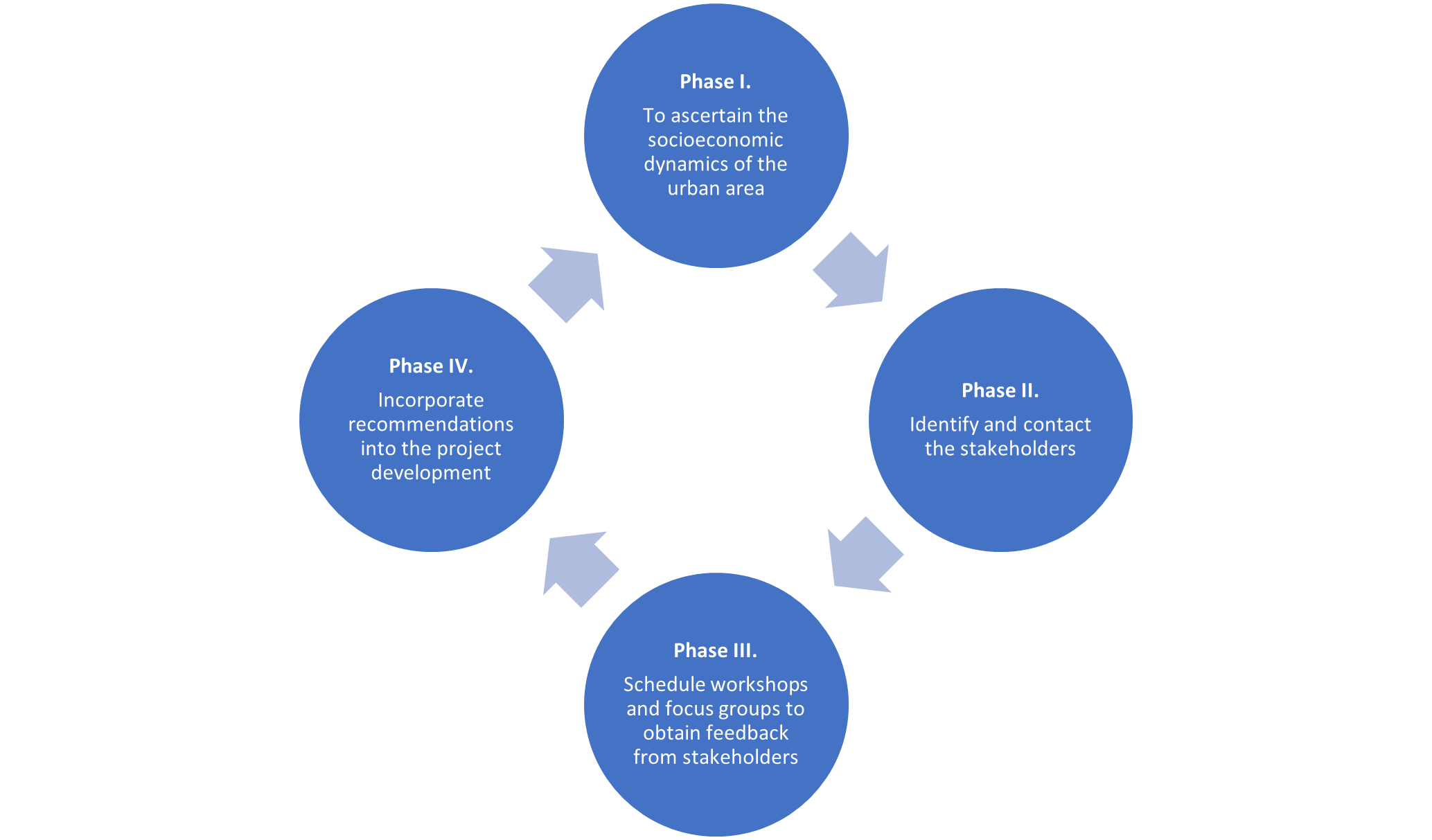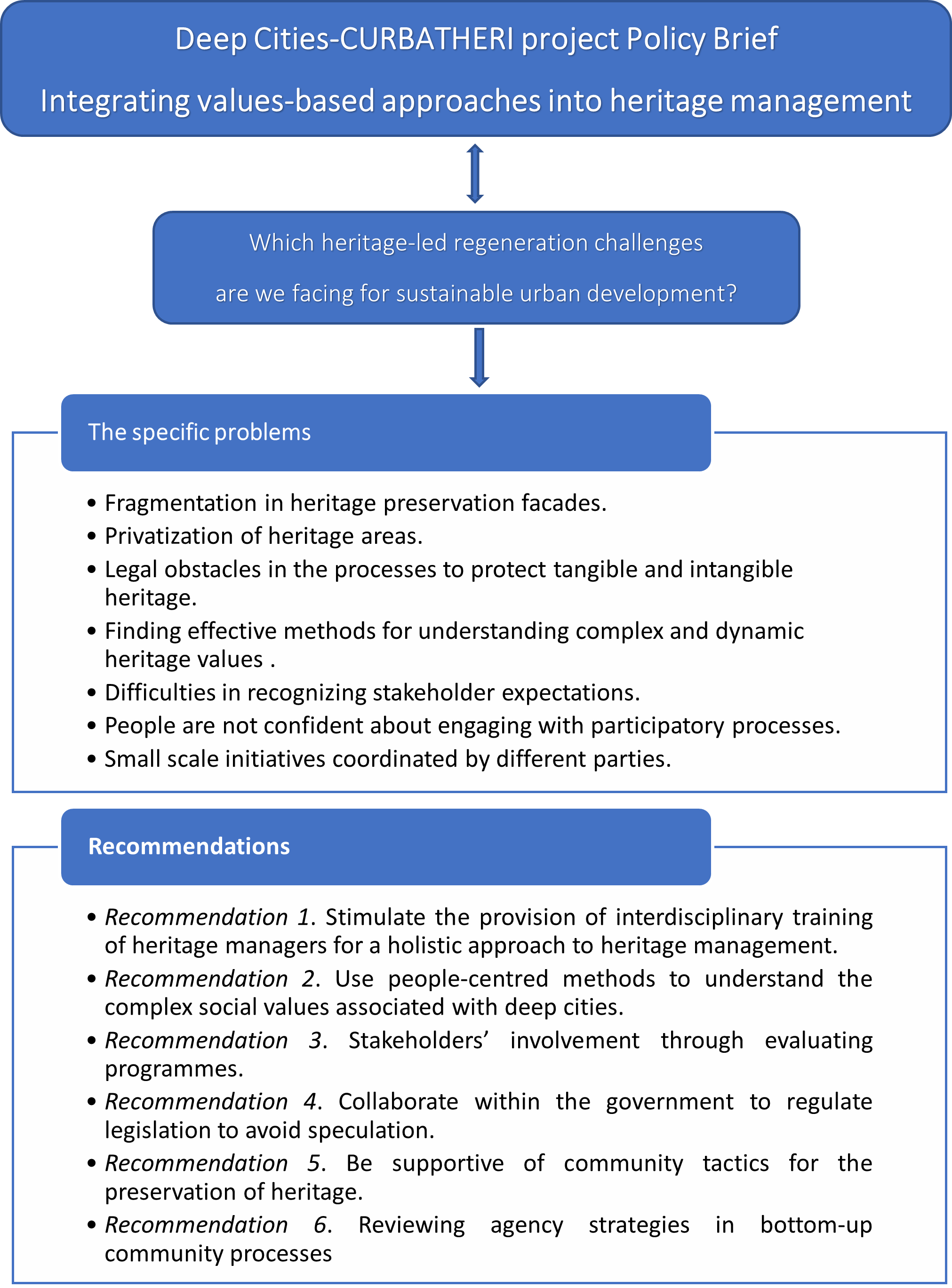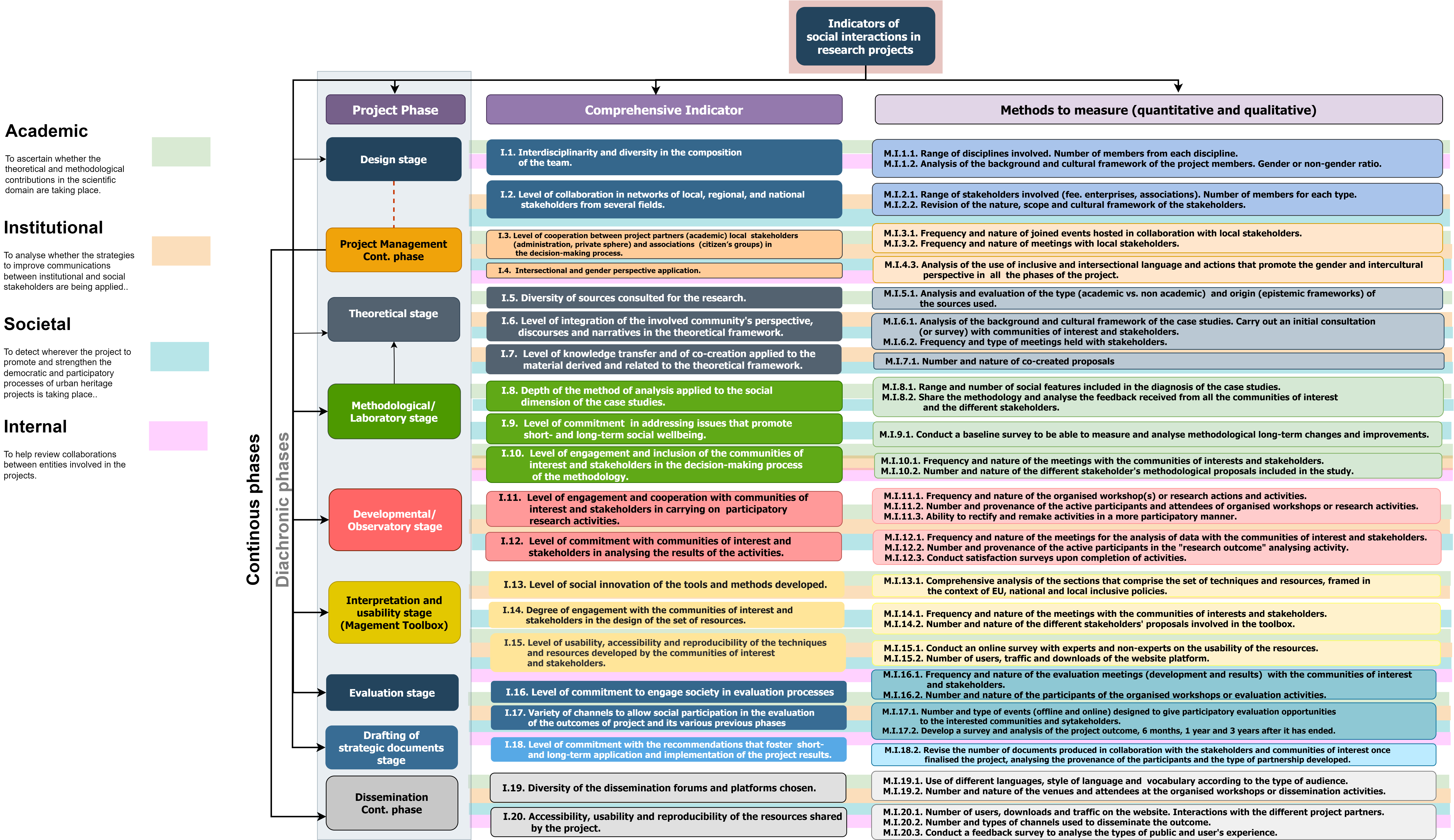Evaluation and Recommendations - Integrating society through evaluation processes and measuring the impact of social interactions in research projects
The Deep Cities approach is fundamental for assessing how the social impact of projects and participatory processes related to heritage can be understood. This analysis is based on the interaction between the different historical and socio-spatial layers that conform the transformation of urban heritage. For this purpose, the University of Barcelona has developed:
1) an indicators matrix for exploring the social impact that is produced by the research interactions
2) a set of guidelines for participative processes in evaluation procedures
3) a Policy Brief for heritage managers based on the recommendations to the issues identified in the different sections of the project.

Evaluation and Recommendations:
- INDICATORS MATRIX
- GUIDELINES
- POLICY BRIEF
-
SCOPE AND LIMITATIONS OF EVALUATION AND RECOMMENDATIONS IN RESEARCH PROJECTS
- Aknowledgements
- Further Readings
- RESOURCES to download
These three tools are aligned to the core values of the project and keep a permanent dialogue with the material, historical, economic, political, and cultural dimensions that characterise the urban ecosystems complexity. These tools aim to improve the ways academics, practitioners and other expert stakeholders integrate the society, and the local communities in sustainable strategies for the conservation of urban heritage. They are devised to guide urban policies committed to sustainable preservation.
All these tools are available for the download in the RESOURCES Section.
Social Impact: Indicators Matrix, Measuring the social interactions in research projects
The matrix, which is based on the premise that social inclusiveness is related to the sustainability of our strategies and methods, explores ways to identify, measure, and monitor how the work carried out in our academic projects may impact on the social fabric and its inhabitants. A series of phases that are common in research projects are proposed, connecting these to three knowledge-building dimensions where stakeholders can identify themselves: the scientific or academic, the institutional and the social. In addition, an internal evaluation dimension is proposed, which serves to monitor and include possible improvements to the societal character of our research, being a tool that can be extrapolated to other projects involved in the application of collaborative academia-society projects.
For each project phase, a set of comprehensive indicators and a series of methods to measure its scope are proposed. These indicators seek to monitor whether the project has continuous interaction with the stakeholders in an orientated way. This matrix can be extrapolated to other social sciences and humanities fields research projects. One of its objectives is to bridge the gap that usually exists between academic output and epistemic knowledge transfer. It seeks to help to co-create science, which means working "with people" and not "for people". As it is arranged by phases and each of them has a set of distinct indicators (described in the deliverable), any user can adapt the indicators to the different stages of their projects.
Indicators Matrix © University of Barcelona
Guidelines to evaluate participatory processes
The guidelines for evaluating participatory processes in projects are designed to be a guide for urban planning practitioners and seek to transform the usual formats of urban heritage management. They aim to identify and include how people live and perceive heritage in the project evaluation process. They also aim to detect the points of view of the different stakeholders involved as promoters of the heritage conservation processes.
Heritage projects are shaped by expert stakeholders and the social inclusion strategies do not always consider local voices. The main aim of a participatory evaluation is to involve every stakeholder in any heritage conservation projects. The project evaluation must follow its development from the first stage, when the proposal is drafted, to the final stage, when its conclusions and recommendations are made (described in the deliverable).

Guidelines for evaluating participatory processes © University of Barcelona
Policy Brief, Integrating values-based approaches into heritage management
In this policy brief, we present a series of recommendations for configuring sustainable heritage preservation strategies based on our understanding of how historical urban transformations could be a source of inclusive discourses and narratives within what has been called the "Deep City." The promotion of multistakeholder dialogue scenarios may serve to enable decision makers to better understand the multifaceted "deep history" of a place through shared social and cultural values.
This proposal intends to integrate the analysis of urban transformations through mapping different uses and intersectional voices to contribute to boosting social sustainability actions. The ‘deep cities’ approach for historical urban areas implies a diversity of values which may be in conflict.
For several months, we have tried to demonstrate with empirical research the operationalization of a plural vision of heritage for the design of desirable and sustainable cities. The objective was to develop a series of tools that enabled reflexive and deliberative management processes in the meantime that enhanced social inclusion through strategies of knowledge co-production and the discovery of shared values associated with a temporary and physically fragmented heritage.
The main objective of this policy brief is to make several recommendations to heritage managers including policymakers, heritage officers, and planners, at national, sub-national and local levels of government.

Policy Brief © University of Barcelona
Scope and limitations of evaluation and recommendations in research projects
The tools created by the University of Barcelona aim to integrate society in the development of research projects, mainly in the field of evaluation processes and public policy recommendations. Three tools have been proposed: the indicators matrix; the guidelines for participative processes; and the Policy Brief. These tools are intended to assist heritage managers, including policymakers, heritage officers, and planners, at national, sub-national and local levels of government. They are meant to provide heritage managers with the clues to understand the heritage values that all other stakeholders, and the local community in particular, would like to preserve. Unveiling these values is not an easy task, and political agents and urban planners usually find it difficult to identify them. Having tools for their detection should facilitate the dialogue between the different stakeholders involved in the promotion of heritage conservation. This is where the main contribution of these evaluation tools lies, because the tools propose strategies to monitor the social impact of, and the social interactions involved in research projects. However, for the tools to be effective models of urban management alternative to the most crude neoliberal urbanism should be applied. The neoliberal model tends to exclusively preserve those heritage values that are profitable in economic terms, excluding, at the same time, the social values that people generate from their daily lives, values that are essential for society’s wellbeing. For this reason, the recommendations of the Policy brief are an important contribution to move towards integrating values-based approaches into heritage management.
It must be remembered that the tools for evaluation and recommendations in research projects are not intended to be a rigid procedure. On the contrary, their objective is to serve as a guide that should be adapted to each particular study and to each particular stage the study is going through. They should be moulded depending on the research challenges of each specific project and, above all, to the profile and role of stakeholders in the heritage preservation process.
Aknowledgements
The team from the Universitat de Barcelona would like to extend our appreciation and thanks to the many people who participated in or otherwise supported the Deep Cities activities. Our research would not have been possible without the contributions of many individuals – community members, heritage professionals, local officials, third sector groups, and others – who gave generously of their time and knowledge.
For their support in the Barcelona case studies, the team would like to thank: Josep Maria Solias (Head of Heritage and Director of the Museum of Hospitalet), Antoni Nicolau (Development Director of Kultura, S.L.), Iolanda Marrasé (Director of Can Fontanet), Pere Fernández (Amics de la Fabra i Coats).
Last update
23.07.2023

